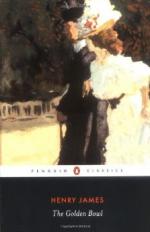to operate. How tragic, in essence, the very
change made vivid, the instant stiffening of the spring
of pride—this for possible defence if not
for possible aggression. Pride indeed, the next
moment, had become the mantle caught up for protection
and perversity; she flung it round her as a denial
of any loss of her freedom. To be doomed was,
in her situation, to have extravagantly incurred a
doom, so that to confess to wretchedness was, by the
same stroke, to confess to falsity. She wouldn’t
confess, she didn’t—a thousand times
no; she only cast about her, and quite frankly and
fiercely, for something else that would give colour
to her having burst her bonds. Her eyes expanded,
her bosom heaved as she invoked it, and the effect
upon Maggie was verily to wish she could only help
her to it. She presently got up—which
seemed to mean “Oh, stay if you like!”
and when she had moved about awhile at random, looking
away, looking at anything, at everything but her visitor;
when she had spoken of the temperature and declared
that she revelled in it; when she had uttered her thanks
for the book, which, a little incoherently, with her
second volume, she perhaps found less clever than
she expected; when she had let Maggie approach sufficiently
closer to lay, untouched, the tribute in question
on a bench and take up obligingly its superfluous
mate: when she had done these things she sat down
in another place, more or less visibly in possession
of her part. Our young woman was to have passed,
in all her adventure, no stranger moments; for she
not only now saw her companion fairly agree to take
her then for the poor little person she was finding
it so easy to appear, but fell, in a secret, responsive
ecstasy, to wondering if there were not some supreme
abjection with which she might be inspired. Vague,
but increasingly brighter, this possibility glimmered
on her. It at last hung there adequately plain
to Charlotte that she had presented herself once more
to (as they said) grovel; and that, truly, made the
stage large. It had absolutely, within the time,
taken on the dazzling merit of being large for each
of them alike.
“I’m glad to see you alone—there’s
something I’ve been wanting to say to you.
I’m tired,” said Mrs. Verver, “I’m
tired—!”
“Tired—?” It had dropped the next
thing; it couldn’t all come at once; but Maggie
had already guessed what it was, and the flush of
recognition was in her face.
“Tired of this life—the one we’ve
been leading. You like it, I know, but I’ve
dreamed another dream.” She held up her
head now; her lighted eyes more triumphantly rested;
she was finding, she was following her way. Maggie,
by the same influence, sat in sight of it; there was
something she was saving, some quantity of which
she herself was judge; and it was for a long moment,
even with the sacrifice the Princess had come to make,
a good deal like watching her, from the solid shore,
plunge into uncertain, into possibly treacherous depths.
“I see something else,” she went on; “I’ve
an idea that greatly appeals to me—I’ve
had it for a long time. It has come over me that
we’re wrong. Our real life isn’t
here.”




